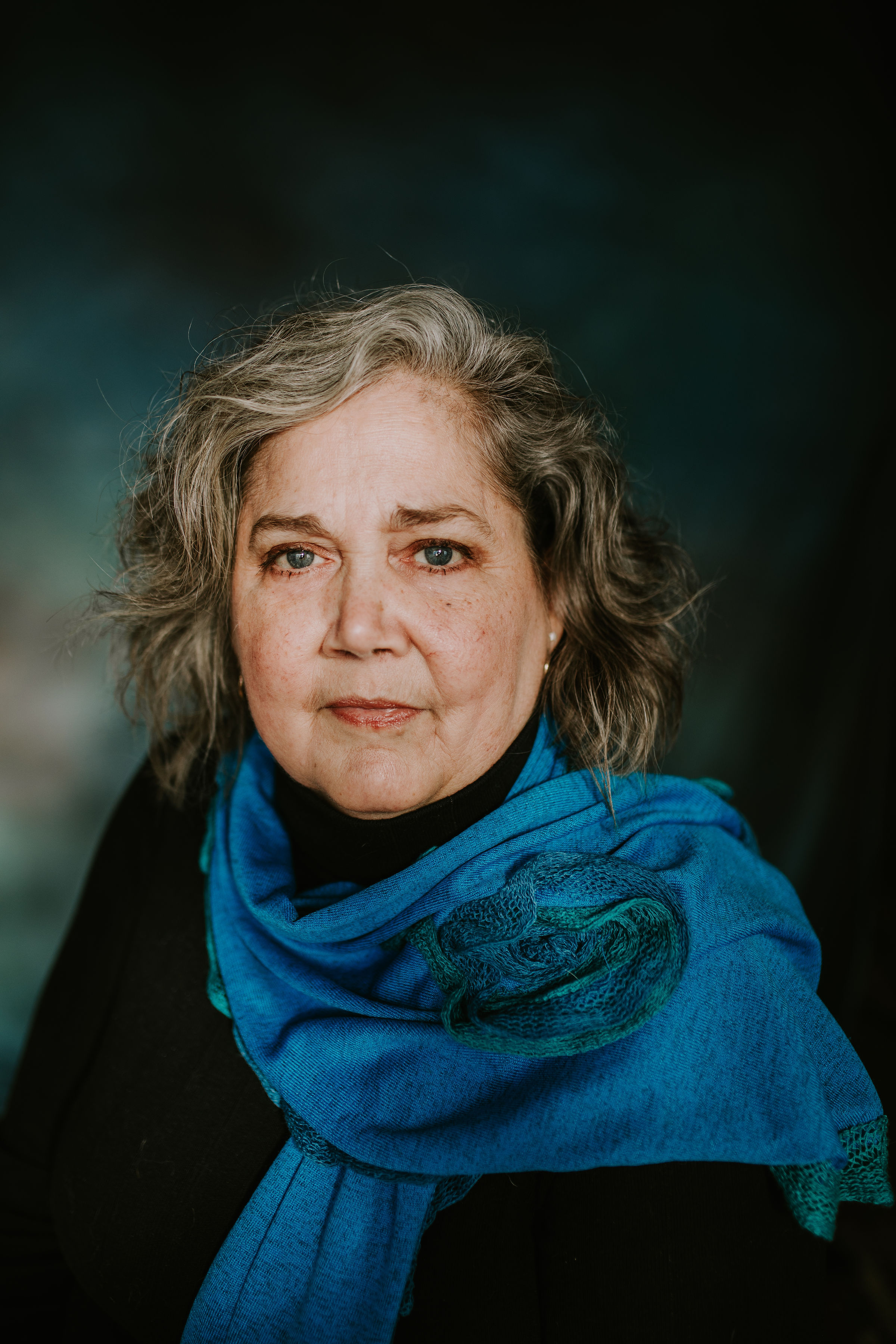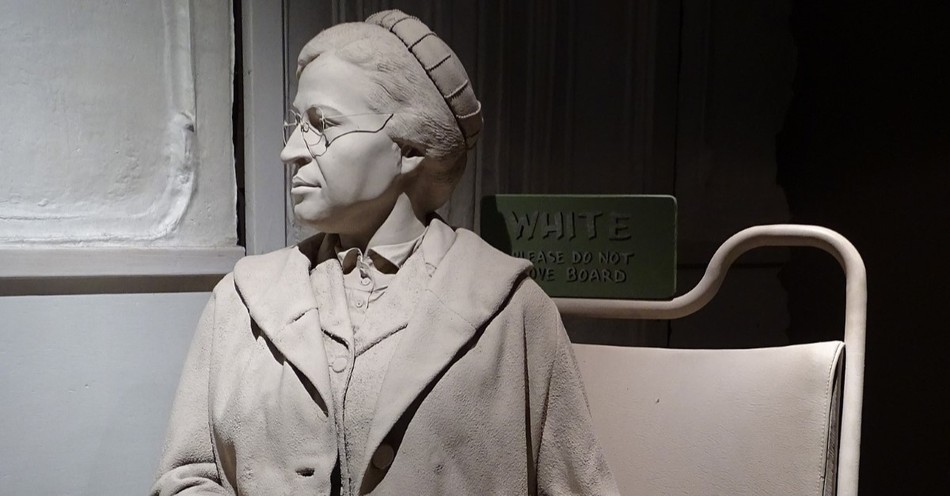There are advantages to behaving and looking like “a proper, middle-aged woman.” Rosa McCauley Parks was immaculately groomed with refined manners and quiet courtesy when she was arrested and jailed for refusing to give up her seat on a city bus in Montgomery, Alabama. She was 42 years old when she sat down for justice on December 1, 1955, when she was 42 years old—her feet and back most likely aching after a long day of seamstress work. The “white” seats on a city bus were full when a white man entered the bus, and the bus driver asked Parks to give up her seat in the first row of the “colored” seats section at the back of the bus.
Parks refused to give up her seat. Her civil manners encouraged city authorities to treat her with some degree of respect when she was arrested.
Four days before refusing to give up her city bus seat, as one of the leaders of the youth division of the Montgomery NAACP, Parks had learned that 14-year-old Emmett Till’s murderers had been acquitted. This travesty of justice most likely inspired her to protest giving up her seat to a white man. She had been involved in the local Advancement of Colored People (NAACP) organization for about 10 years before the bus incident, acting as organization secretary since 1943. As a fiercely determined woman who projected a dignity that even racist media outlets couldn’t deny, Rosa Parks was the perfect public candidate for standing up for equal rights for African Americans.
How Did Rosa Parks Become Important to the Civil Rights Movement?
Civil rights activists in Montgomery organized a one-day bus boycott on the day of Rosa Park’s trial, which resulted in her being fined. Feeling it was successful, the group founded the Montgomery Improvement Association and began a long-term, citywide bus boycott. A new local minister, 25-year-old Rev. Martin Luther King, Jr., led the boycott. The strike lasted 13 months, ending when the U.S. Supreme Court ruled that segregation on public buses was unconstitutional.
Rosa Parks’ leadership in many nonviolent protests following this event changed the history of interracial relations in the United States.
How Did Rosa Parks’ Faith Inform Her Activism?
Rosa Parks was aware that southern whites had historically believed that enslaved black people had no souls, making persecuting them more acceptable. Yet, she said, “God is everything to me.”
All her life, Parks remained a devoted member of the African Methodist Episcopal (AME) Church, founded in 1816 in Philadelphia by a formerly enslaved person, Bishop Richard Allen. She remembered, “The church, with its musical rhythms and echoes of Africa, thrilled me when I was young.” The church passed the enslaved West Africans’ spiritual lives down to the 1920s Alabama sharecroppers. Early in the slave trade, Yoruban priests in America could recite religious teachings.
Following the African-American faith’s literary tradition, she memorized Bible verses in Sunday School and could quote Scripture freely. Reading Psalms 23 and 27 early in her life gave her the strength to love her enemies. Her understanding of Jesus Christ’s life convinced her that a heart filled with love could conquer anything, even bigotry.
In her childhood, she realized it wasn’t wise to “turn a cheek” when her people’s lives were at stake. Members of the local Klu Klux Klan used to parade up and down the road in front of her grandparents’ house. At night, her grandfather slept with a gun across his lap, and Parks slept at his feet, waiting for something bad to happen. The Klu Klux Klan never attacked their home, but her grandfather taught her not to accept bad treatment from anyone. “From my upbringing and the Bible I learned people should stand up for rights,” she recalled, “just as the children of Israel stood up to Pharaoh.”
Conservative Christians gradually came to believe in the truth of arguments for ending the Jim Crow laws. As time passed, black people were allowed to sit in the balconies of some churches in the South—a change shown in the novel To Kill a Mockingbird, published in 1960. In 1995, the Southern Baptist Convention formally apologized to African Americans. In 2018, members published a 71-page report documenting and condemning the convention’s own pro-slavery and white supremacist history. The Southern Baptist Convention formally stated that black people’s fight for equality and an end to institutional segregation “... appealed to a higher authority than the cultural captivity of white supremacy. These arguments appealed to the authority of Scripture and the historic Christian tradition.” For Southern Baptists, institutional segregation crumbled just as slavery had ended in the previous century.
What Causes Did Rosa Parks Promote Along with Civil Rights?
Though Park had worked with Rev. Martin Luther King and other nonviolent protesters in Montgomery, she occasionally disagreed with them about protest methods. She later supported the Black Power movement, and this disagreement with other Civil Rights leaders contributed to her decision to move north.
Parks moved with some of her relatives to Detroit, Michigan, in 1957, leaving behind her home but keeping her awareness of unfair race relations. In the 1960s, she participated in activities such as the Pilgrim Pilgrimage for Freedom in Detroit, a March on Washington, D.C., for Jobs and Freedom, and a Poor People’s Campaign. From 1965 to 1988, she worked as a secretary in Congressman John Conyers’ District 1 office in Detroit, which supported fair housing.
Parks was a lifelong advocate for civil rights of many different kinds. She advocated for women’s rights—she and her husband were active League of Women Voters members. Parks also protested against the Vietnam War. Her voice was also heard speaking out for prisoners’ rights. In politics, she supported the presidential campaigns of Jesse Jackson in 1984 and 1988. In the 1980s, she participated in anti-apartheid protests and was part of the welcoming committee when Nelson Mandela visited the United States. In 1987, she and her husband co-founded the Rosa and Raymond Parks Institute for Self-Development, an organization that worked to educate and give direction to youth.
What Lessons Can Christians Learn from Rosa Parks?
The greatest nonviolent protester ever was Jesus Christ, who was led into Roman government chambers and unjustly sentenced to death. He says few words to defend himself. In the Bible’s gospel of Luke, when Jesus is asked if he is the Messiah, he says, “This is what you say I am” (Luke 23:3). Jesus was not a violent protester. He knew Scripture foretold that people would do violence to him—God’s son, the Messiah, would be persecuted and die for our sins. Thanks to his sacrifice, no one else must die or suffer for another’s sins.
Rosa Parks, like Rev. Dr. Martin Luther King, Ghandi, and various leaders protesting inflamed racial situations today, have used nonviolence in their attempts to remedy social injustice. A quiet, grandmotherly type, she spread the word that separate but equal is not equal. She changed a city’s public service and a nation’s public policy without using words that would inflame her detractors. Her brave actions have resonated through decades of civil rights protests leading to advancements for African Americans and many other disenfranchised groups.
Rosa Parks was awarded NAACP’s Springarn Medal in 1979, the Presidential Medal of Freedom in 1996, and the Congressional Gold Medal in 1999. Her body lay in state at the United States Capitol Rotunda after she died on October 24, 2005. Her legacy of treating everyone with the same love and respect is timeless.
We can be like Rosa Parks. We can quietly assert that all people deserve justice. We can also act in ways that promote fairness in our communities.
Inspiring Books by Rosa Parks
Parks wrote several excellent books about her experience:
Rosa Parks: My Story. by Rosa Parks and Jim Haskins. Dial Books, 1992.
Quiet Strength: The Faith, the Hope, the Heart of a Woman Who Changed a Nation. by Rosa Parks and Gregory J. Reed. Zondervan, 1994.
Dear Mrs. Parks: A Dialogue with Today’s Youth. by Rosa Parks and Gregory J. Reed. Lee and Low Books, 1996.
“People always say that I didn’t give up my seat because I was tired, but that isn’t true. I was not tired physically, or no more tired than I usually was at the end of a working day. I was not old, although some people have an image of me as being old then. I was forty-two. No, the only tired I was, was tired of giving in.” — Rosa Parks, quoted in Rosa Parks: Freedom Rider by Ruth Asby
Photo Credit: Flickr/Adam Jones

This article is part of our People of Christianity catalog that features the stories, meaning, and significance of well-known people from the Bible and history. Here are some of the most popular articles for knowing important figures in Christianity:
How Did the Apostle Paul Die?
Who are the Nicolaitans in Revelation?
Who Was Deborah in the Bible?
Who Was Moses in the Bible?
King Solomon's Story in the Bible
Who Was Lot's Wife in the Bible?
Who Was Jezebel in the Bible?
Who Was the Prodigal Son?



